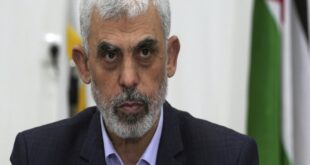
An astonishing global shift is under way: 127 countries have now stated that by mid-century their overall emissions of carbon dioxide will be zero. That includes the EU, US, and UK by 2050 – and China by 2060. Companies are enthusiastically signing up to similar “net zero” goals. Finally the international community seems to have accepted the scientific fact that we need to stop adding greenhouse gases to the atmosphere to stabilise our climate. Dare we hope that the climate crisis can be brought under control?
Perhaps, but big problems remain. Long-term commitments have not resulted in sufficient near-term actions. The world is on track for emissions to be just 0.5% below 2010 levels by 2030, compared with the 45% needed on the road to net zero by 2050. The pivotal Glasgow Cop26 climate talks in November will need to tackle this. But a more insidious problem is emerging. Net zero increasingly involves highly questionable carbon accounting. As a result, the new politics swirling around net zero targets is rapidly becoming a confusing and dangerous mix of pragmatism, self-delusion and weapons-grade greenwash.
The science of net zero is simple: every sector of every country in the world needs to be, on average, zero emissions. We know how to do this for electricity, cars, buildings and even a lot of heavy industry. But in certain areas, including air travel and some agricultural emissions, there is no prospect of getting to zero emissions in the near future. For these residual emissions, greenhouse gasses will need to be sucked out of the atmosphere at the same rate as they are added, so that, on average, there are net zero emissions.
Making this work requires carbon removal, also known as “negative emissions”. This can be low-tech, like restoring forests, as this takes carbon out of the atmosphere and stores it in trees. Or it can be hi-tech, like using chemicals to strip carbon dioxide from the atmosphere and then pumping it deep underground into safe geological storage. In theory this is all fine, as pragmatically some carbon removal is needed to balance hard-to-reduce emissions: but negative emissions and offsetting alone are not a route to net zero.
In practice, by believing in the promise of these methods, we are too often deceiving ourselves, in three major ways. The first is an unrealistic overreliance on carbon removal to preserve the status quo. Shell recently published its net zero plan, that actually projects high oil and gas production through to 2050 and beyond, which voila, are magically removed with negative emissions. Critically, there is far too little land to plant enough trees to counter today’s emissions, and large-scale hi-tech methods do not yet exist.
The second deception is in offsetting against notional emissions trajectories instead of removing carbon from the atmosphere. Mark Carney, the ex-governor of the Bank of England and climate adviser to Boris Johnson, recently described his $600bn Brookfield Asset Management portfolio as “carbon neutral”, despite investing in fossil fuels. Carney said: “The reason we’re net zero is that we have this enormous renewables business.” He went on to claim that renewables avoid carbon emissions that would otherwise have happened, so they “offset” his investments in fossil fuel emissions. This is not net zero. It is an accounting trick. Emitting carbon at the same time as building solar capability does not equal zero emissions overall. Offsetting needs to be used to remove carbon dioxide from the atmosphere to counter difficult-to-remove emissions, and not just be an enabler of business-as-nearly-usual.
The third deception comes from not getting what you think you’re paying for in the self-regulated global carbon market. The commercial carbon offset concept relies on “additionality” – that money paid then reduces emissions or captures carbon that would not otherwise have happened. A recent report I advised on showed that the offsets market is awash with old legacy carbon credits where that assumption is violated,some 600m tonnes of these environmentally poor-quality credits are available to buy, six times the current size of the voluntary carbon market. These old credits come from projects that have already happened, meaning buying additional credits provides no additional climate benefit. Energy giant Total recently bought these near-worthless credits.
What is to be done? Negative emissions and offsets are here to stay. In a limited way, they are needed to stabilise the climate as they are the only way to tackle the hardest-to-eliminate emissions. Urgent discussion is needed about what comprises a “residual emission” that requires offsetting. In practical terms, making the carbon accountancy trustworthy will require truly independent regulation that is based on science. It is the only way to contain the bad actors and release the capital of good actors. Solving these carbon deceptions should be a core outcome of the Glasgow Cop26 climate summit.
If such deceptions remain, disaster looms. Big finance, led by Carney, is planning to massively expand carbon markets. Conceivably, new carbon-based financial products could boom, with little impact on emissions. Just like the sub-prime crisis, few will understand what they bought, and another globe-spanning crash could sweep the world, compounding economic and climate crises causing mass suffering, as we realise again that the Earth owes us nothing. Nature doesn’t do bailouts.

By Simon Lewis is professor of global change science at University College London and University of Leeds, and the author, with Mark Maslin, of The Human Planet: How We Created the Anthropocene – theguardian.com




 World Opinions Débats De Société, Questions, Opinions et Tribunes.. La Voix Des Sans-Voix | Alternative Média
World Opinions Débats De Société, Questions, Opinions et Tribunes.. La Voix Des Sans-Voix | Alternative Média




